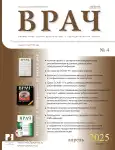Клинико-прогностическое значение биомаркеров NT-proBNP и sST2 у пожилых пациентов с сердечной недостаточностью и сопутствующей патологией
- Авторы: Кочеткова И.В.1, Трофимова Т.Г.2, Лыков Ю.А.3, Кухарчук А.Е.3
-
Учреждения:
- Воронежский государственный медицинский университет им. Н.Н. Бурденко
- Воронежский государственный университет
- Белгородский государственный национальный исследовательский университет
- Выпуск: Том 36, № 4 (2025)
- Страницы: 62-67
- Раздел: Из практики
- URL: https://medbiosci.ru/0236-3054/article/view/290943
- DOI: https://doi.org/10.29296/25877305-2025-04-13
- ID: 290943
Цитировать
Аннотация
В статье представлен обзор современных данных о прогностической ценности биомаркеров крови – N-концевого пропептида мозгового натрийуретического пептида (NT-proBNP) и растворимой формы рецептора ST2 (sST2) у пожилых коморбидных пациентов с хронической сердечной недостаточностью (ХСН). На основании проведенного анализа обоснована целесообразность комбинированного использования NT-proBNP и sST2 для точной стратификации риска и персонализации терапевтических подходов у пожилых пациентов с ХСН и множественной сопутствующей патологией.
Полный текст
Открыть статью на сайте журналаОб авторах
И. В. Кочеткова
Воронежский государственный медицинский университет им. Н.Н. Бурденко
Email: iri4217@yandex.ru
SPIN-код: 9933-5015
кандидат медицинских наук
Россия, ВоронежТ. Г. Трофимова
Воронежский государственный университет
Email: iri4217@yandex.ru
ORCID iD: 0009-0006-2818-9134
SPIN-код: 4567-4489
кандидат медицинских наук
Россия, ВоронежЮ. А. Лыков
Белгородский государственный национальный исследовательский университет
Email: iri4217@yandex.ru
ORCID iD: 0000-0002-4185-5502
SPIN-код: 2822-9134
Россия, Белгород
А. Е. Кухарчук
Белгородский государственный национальный исследовательский университет
Автор, ответственный за переписку.
Email: iri4217@yandex.ru
ORCID iD: 0000-0003-3881-2138
SPIN-код: 5035-1117
Россия, Белгород
Список литературы
- Montalto M., D’Ignazio F., Camilli S. et al. Heart Failure in Older Patients: An Update. J Clin Med. 2025; 14 (6): 1982. doi: 10.3390/jcm14061982
- Bahuleyan C.G., Alummoottil G.K., Abdullakutty J. et al. Prognostic value of soluble ST2 biomarker in heart failure patients with reduced ejection fraction – A multicenter study. Indian Heart J. 2018; 70 (Suppl 1): S79–S84. doi: 10.1016/j.ihj.2017.09.010
- Morrow D.A. Cardiac Biomarkers and Heart Failure [Internet]. Washington (DC): American College of Cardiology, 2015. URL: https://www.acc.org/Latest-in-Cardiology/Articles/2015/02/09/13/00/Cardiac-Biomarkers-and-Heart-Failure
- Tsutsui H., Albert N.M., Coats A.J.S. et al. Natriuretic peptides: role in the diagnosis and management of heart failure: a scientific statement from the Heart Failure Association of the European Society of Cardiology, Heart Failure Society of America and Japanese Heart Failure Society. Eur J Heart Fail. 2023; 25 (5): 616–31. doi: 10.1002/ejhf.2848
- Boman K., Thormark Fröst F., Bergman A.R. et al. NTproBNP and ST2 as predictors for all-cause and cardiovascular mortality in elderly patients with symptoms suggestive for heart failure. Biomarkers. 2018; 23 (4): 373–9. doi: 10.1080/1354750X.2018.1431692
- Aimo A., Januzzi J.L., Vergaro G. et al. Clinical and prognostic significance of sST2 in heart failure: insights from the multicenter observational study. J Am Coll Cardiol. 2019; 74 (18): 2193–203. doi: 10.1016/j.jacc.2019.08.1039
- Castiglione V., Aimo A., Vergaro G. et al. Biomarkers for the diagnosis and management of heart failure. Heart Fail Rev. 2022; 27 (2): 625–43. doi: 10.1007/s10741-021-10105-w
- Alonso N., Lupón J., Barallat J. et al. Impact of diabetes on the predictive value of heart failure biomarkers. Cardiovasc Diabetol. 2016; 15 (1): 151. doi: 10.1186/s12933-016-0470-x
- Wang Z., Pan X., Xu H. et al. Serum Soluble ST2 Is a Valuable Prognostic Biomarker in Patients With Acute Heart Failure. Front Cardiovasc Med. 2022; 9: 812654. doi: 10.3389/fcvm.2022.812654
- Meijs C., Handoko M.L., Savarese G. et al. Discovering Distinct Phenotypical Clusters in Heart Failure Across the Ejection Fraction Spectrum: a Systematic Review. Curr Heart Fail Rep. 2023; 20 (5): 333–49. doi: 10.1007/s11897-023-00615-z
- Najjar E., Faxén U.L., Hage C. et al. ST2 in heart failure with preserved and reduced ejection fraction. Scand Cardiovasc J. 2019; 53 (1): 21–7. doi: 10.1080/14017431.2019.1583363
- Beetler D.J., Bruno K.A., Di Florio D.N. et al. Sex and age differences in sST2 in cardiovascular disease. Front Cardiovasc Med. 2022; 9: 1073814. doi: 10.3389/fcvm.2022.1073814
- Lupón J., de Antonio M., Vila J. et al. Development of a novel heart failure risk tool: the barcelona bio-heart failure risk calculator (BCN bio-HF calculator). PLoS One. 2014; 9 (1): e85466. doi: 10.1371/journal.pone.0085466
Дополнительные файлы








